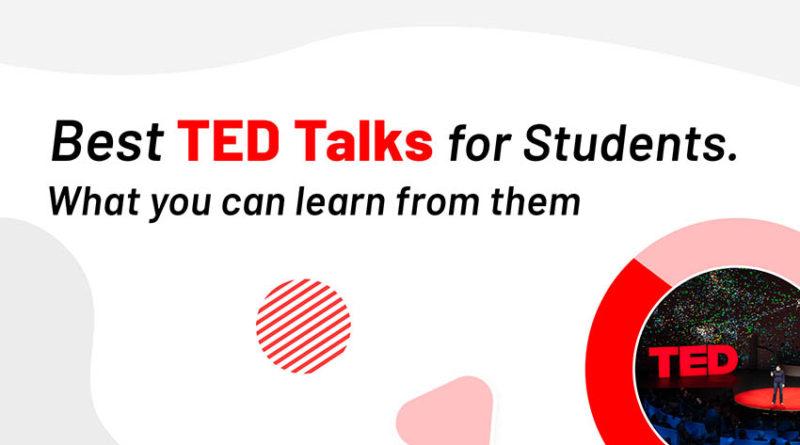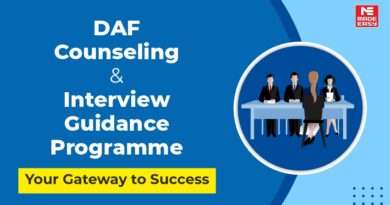3 Best TED Talks for Students. What you can learn from them
TED talks are highly influential speaking sessions. On June 27, 2006, the first TED talk was posted online. These talks form a crucial part of the popular TED events that serve audiences in different niches such as personal growth, communication, future, health, social change, nature, and science, to name a few. TED works with different organizers to conduct these beneficial events in the form of the best TED talks for students. Preparing for an exam is not an easy task, especially in case of the competitive exams such as GATE and ESE Exams.
Interesting fact: Do you know as per the latest reports – more than 3000 TED-related events are held every year?
Most competitive exam aspirants will understand and accept the fact that the entire exam preparation journey comprises piles of books present around all time, and having a monotonous study routine, eating and sleeping can sometimes be boring and tiresome. This routine is difficult to carry on for a very long time and it is difficult to stay focused and dedicated the whole year.
It is necessary to take small breaks between your studies. However, you need to make sure that these breaks are refreshing and do not disturb your studies. Therefore, whenever you feel your brain is not taking the course content you are currently in and you want to take a little break, TED talks for students are the best respite from your busy schedule.
What is a TED talk?
TED is a non-profit organization dedicated to sharing important and innovative ideas with the world. This channel is the world’s most innovative, inspirational, and motivational people deliver short and powerful talks on the issue or concern of their choice and expertise. It focuses on and believes in the ‘ideas that are worth sharing. These TED talks’ topics engage the students and spark the fire for dreaming big in life and chasing their dreams with full valor and confidence. The best part is the TED platform conducts different types of TED talks.
What is TEDx?
TEDx brings the motive of the global community of TED to bring the spirit of TED’s mission to bring awareness and spread ideas to local communities around the globe.
What is TED-Ed?
TED-Ed is the renowned youth and education initiative of TED. The initiative aims to encourage and celebrate the ideas of students and teachers across the world. The dedicated work of TED has built a network of 2,50,000 teachers across the world. This award-winning platform now serves millions of teachers and students worldwide.
It is not difficult to find these TED videos online. One can either log on to YouTube to find the official TED channel which has thousands of videos or download the TED talks app. Interested individuals can listen to some amazing talks and ideas which will help them grow and become smarter.
Out of several videos available on the TED platform, we have picked up the top 3 best TED talks that have served as the most motivational TED talks in the present times. The best TED talks for students that one can refer to while preparing for the exam to stay focused and confident include the following:
How to stay calm when you know you’ll be stressed: Daniel Levitin
The GATE or ESE examination is a national exam where the level of competition that one goes through is extremely tough. Therefore, while preparing for the exam the one thing that every student goes through is – ample stress. The stress of ‘whether my preparation is on point’, ‘how will I perform in the exam’, ‘is my friend studying more than I am’ and ‘what does the future has in store for me’ frequently pulls the students down and derails them from their path. Talking about similar situations when one gets stressed out and has no idea how to react in such a situation, Daniel Levitin gives us the key to staying calm.
Daniel Levitin, a neuroscientist by training, knows a great deal about how the brain works under stress, and to avoid all the hustle and panic that we go through in our daily lives. He gives scientific reasons and explanations of how we can keep ourselves perfectly calm by preparing beforehand. During stress, the brain releases Cortisol which raises your heartbeat, modulates your adrenaline level, and clouds your thinking. In such a situation there isn’t much that one can do. Daniel talks about a fantastic and different strategy called ‘prospective hindsight or post-mortem’. This indicates that it is one of the most impactful motivational TED talks.
We all have heard of post-mortem; it is the examination of something after it has occurred. In pre-mortem, one has to look ahead and try to figure out all the things that can go wrong. Once completed, you need to take preventive actions to stop that particular activity or event from happening and minimize the possible damage.
For instance, while preparing for a subject say Thermodynamics (an important topic in Mechanical Engineering) for the examination, you feel that you will not get enough time later to complete the subject as you have less time left in your hand. Make sure that you focus on preparing for important topics such as the Laws of thermodynamics, Diesel, Otto, and dual cycle, from the subject. In addition, make sure to practice the previous year’s questions from the subject. It will ensure that you do not waste time reading everything and panic. In addition, you can avoid unnecessary panic and worries. In this way, you take back control of your calmness and avoid being impacted by external sources.
In his TED talks, Daniel further talks about a special part of the brain called the hippocampus. This part evolved tens of thousands of years ago and fulfills the responsibility to keep track of the locations associated with the important aspects. In addition, it helps cab drivers (without GPS) memorize the map and squirrels remember the respective location. To stay calm during the events of stress, plan everything, and train yourself to put the system in place. It is because you will be unable to perform your best when you are under stress.
In a similar way to avoid any panic and stress during the examination, make sure you have a fixed routine daily and you practice that sincerely. This makes your brain accustomed to the schedule, thus helping you manage everything well and skip the entire panic scenario right before the exam.
In addition, going over the same thing regularly through revision helps your mind keep track of where and what you have read, and even if you are stressed during the examination, your mind will work perfectly fine remembering everything and anything that you have made it memorize.
Therefore, you must plan, and consider all the risk factors, pros, and cons associated with the activity in focus to reduce stress. Then you will be better prepared to deal with stress and make the correct decisions at the moment. Thus, to stay calm one needs to make a plan and follow it strictly. In addition, to avoid stress revise and train your brain to remember all the important things. To see the expert speak about the topic in his best spirits, check out the positivity TED talk today.
Feats of memory anyone can do: Joshua Foer
For every action, there are a million excuses to stop you from taking that action. The vast syllabus of the GATE and ESE examinations that students have to learn, revise and retain to crack the examination makes most of the students give up halfway. From the ones who continue on their journey many students even after successive revisions find it difficult to remember everything, they have learned and become demoralized.
A freelance journalist, Joshua Foer was the 2006 U.S.A. Memory Champion. He has described his journey from being a journalist who came to cover the USA memory champion to being the winner of the competition in his much-acclaimed 2011 book, Moonwalking with Einstein: The Art and Science of Remembering Everything.
Foer in his TED talks breaks a common myth that some people have special brains and are ‘god gifted’. This is because they can retain so much, while others have weak memory. Such TED talks for students can provide the required help about how they can improve their memory and retain all the information that they gather from the books they read.
Joshua tells us how humans have always been excellent learners but the introduction of paper, pen, and now mobile phones have made us accustomed to not remembering things but noting them down which is why we have become mentally handicapped to remember anything. In his TED talks, Joshua takes us on his journey through the USA memory championship and explains how to use one’s memory to its full capacity by using a technique called the ‘memory palace’. Such motivational TED talks taught me about the importance of mindfulness to students.
Foer learned and practiced the science and techniques behind the miraculous retention of information. He shows how any person with an average memory power can be trained to become a mastermind with the help of simple and essential memory techniques. The ways that Foer talks about in his TED talks for students worked for him and he tells about the science behind it. Instead, he explains how the concept originated and provides a scientific reason for why the technique works.
A Memory Palace is an imaginary location in your mind where you can store mnemonic images. The most common type of memory palace involves making a journey through a place you know well, like a building or town, normally one prefers their home as there are aware of it inside out. So for example, you want to learn about the national parks in India along with the animals that reside there for your GS exam. Here are the steps you follow to make a memory palace:
- Choose a place that you know well like a house, park, or office.
- Plan out a route that you want to take while going through your chosen place.
- Take a list of all the National parks and animals you want to memorize.
- Take one or two items at a time and place a mental image of them in the locus of your memory palace.
- Make the image come alive with your senses. Therefore, while walking in your home, you can place a Horned Rhino (Kaziranga National Park) dancing on your porch, and then as you move further an Asiatic Lion (Gir National Park) is lying on your sofa enjoying dhokla. (Gujarat). Your memory palace can be a silly one. You just have to make it interesting and fun. It will help you remember everything once you visit this palace.
Thus, now every time you want to remember any national park just go through your memory palace and you can recall everything. This way you can learn formulae, concepts, and even your vocabulary very easily.
Thus the memory palace is a master tool that helps you memorize anything that you want in just a couple of minutes. So the overall theme presented by the speaker was that you don’t need to be “smart” or “gifted” to be good at memorizing. Anyone can do it with consistent practice.
How to manage your time more effectively – Brian Christian
While preparing for any exam, students have the query regarding the best time to start with the ESE exam and GATE exam preparation. Well, the answer to this question is ‘It is not the time that needs to be perfect, but its management which is in your hand that needs to be on point’. No matter when you begin your preparation just be aware of the time you have in hand and make the most of it. This is only possible if you have a good strategy for preparation and you manage your time well.
Brian Christian tells that humans can utilize time effectively. Providing an insight into the science of schedule, he gives us an idea of humans’ struggle with time. The first thing that Brian mentions is prioritizing work. Such motivational TED talks for students specify that the time spent on prioritizing your work is time you are not spending doing it. Most students spend hours planning how to study, whether in the library, room, or park with the help of class notes, study material, and books. They buy multiple colour pens to mark in the standard books and notes. Later, they decide whether they need to choose the morning or night study routine.
All the time that aspirants waste in coming up with a ‘perfect plan’ is the time you wasted doing nothing. There is no perfect plan. Therefore, instead of overthinking about what to study, and where to study, it is important that you sit and study. In the best TED talks for students, Brian does not say that one should not have a plan, but that wasting most of your time in making a plan is not beneficial. Therefore, go through the syllabus, prioritize the subjects according to their relevance, make a simple plan, and get going with your studies.
The second thing we all come across is distractions. There are different types of distractions, including calls or messages from friends and family, YouTube videos, a new movie release, and the latest video games. One needs to understand that there is a fundamental trade-off between productivity and responsiveness. Your response to these distractions is directly related to your routine productivity. If a student or individual wants to complete serious work, then you need to ensure that you ‘choose’ to minimize such responses.
One must stop reacting instantly to anything that does not match their expectations. However, being responsive means reacting instantly something comes up. These two principles are fundamentally in tension. Recognizing this tension allows us to decide where we want to strike that balance. The obvious solution is to minimize interruptions.
Thus, Brian introduces us to the key ingredients of time management in his positive TED talks. These ingredients include less prioritizing, more working, and being productive instead of responsive. A similar approach might allow the students including competitive exam aspirants to reclaim their attention and improve their time management.
While there are thousands of videos associated with the best TED talks for students that are worth sharing that will help you a lot in your ESE and GATE exam preparation. These three videos are a must-watch, as they will help answer those questions that every aspirant is struggling with tension, focus, and memory. These talks will help you manage your time while studying, remembering all the topics and subjects you are having trouble learning and memorizing, and keeping you calm despite the tension and worry you come across during the preparation.
You must watch the best TED Talks to get a better insight into the respective topics.
We hope that these videos and our blog will help you in your preparation and inspire you to work hard for the examination.
All the best for your competitive exams!
Following are the links to the videos mentioned above:
- How to stay calm when you know you’ll be stressed – Daniel Levitin
- Feats of memory anyone can do – Joshua Foer
- How to manage your time more effectively (according to machines) – Brian Christian
So, go ahead, and watch the useful videos to enjoy, explore, and use the above beneficial videos.
All the best for your power-packed competitive exam prep & attempt!
Dear Aspirants,
Your preparation for GATE, ESE, PSUs, and AE/JE is now smarter than ever — thanks to the MADE EASY YouTube channel.
This is not just a channel, but a complete strategy for success, where you get toppers strategies, PYQ–GTQ discussions, current affairs updates, and important job-related information, all delivered by the country’s best teachers and industry experts.
If you also want to stay one step ahead in the race to success, subscribe to MADE EASY on YouTube and stay connected with us on social media.
MADE EASY — where preparation happens with confidence.

MADE EASY is a well-organized institute, complete in all aspects, and provides quality guidance for both written and personality tests. MADE EASY has produced top-ranked students in ESE, GATE, and various public sector exams. The publishing team regularly writes exam-related blogs based on conversations with the faculty, helping students prepare effectively for their exams.




